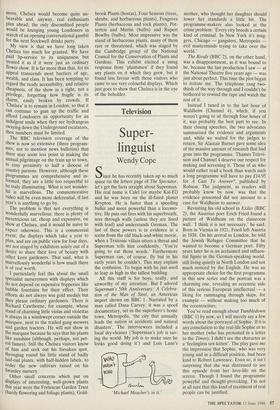Television
Super-
Wendy Cope
Since he has recently taken up so much space on the letters page of The Spectator, let's get the facts straight about Superman. His real name is Calel (or maybe Kal-El) and he was born on the ill-fated planet Krypton. He is faster than a speeding bullet and more powerful than a locomo- tive. He puts out fires with his superbreath, sees through walls (unless they are lined with lead) and understands German. The last of these powers is in evidence in a scene from the old black-and-white movie, when a Teutonic villain utters a threat and Superman tells him confidently, 'You're going to eat those words.' Furthermore Superman can, of course, fly but in his early years he couldn't. This may explain the confusion. To begin with he just used to leap as high as the tallest building.
All this stuff is for boys, really, and unworthy of my attention. But I adored Superman's 50th Anniversary: A Celebra- tion of the Man of Steel, an American import shown on BBC 1. Narrated by a man called Dana Carvey, it was a spoof documentary, set in the superhero's home town, Metropolis, 'the city that annually leads the nation in accidents and natural disasters'. The interviewees included a local dry-cleaner ('Superman's job is sav- ing the world. My job is to make sure he looks good doing it') and Lois Lane's 'Michael Meacher's in it.' mother, who thought her daughter should lower her standards a little bit. The programme-makers also looked at the crime problem: 'Every city breeds a certain kind of criminal. In New York it's mug- gers, Chicago — gangsters, Metropolis — evil masterminds trying to take over the world.'
The Rivals (BBC 2), on the other hand, was a disappointment, as it was bound to be, because the last production I saw — at the National Theatre five years ago — was just about perfect. This time the plot began to irritate me. The telephone rang two- thirds of the way through and I couldn't be bothered to rewind the tape and watch the rest of it.
Instead I tuned in to the last hour of Waldheim (Channel 4), which, if you weren't going to sit through four hours of it, was probably the best part to see. In their closing speeches, the two advocates summarised the evidence and arguments and, while we waited for the judges to return, Sir Alastair Burnet gave some idea of the massive amount of research that had gone into the programme. Thames Televi- sion and Channel 4 deserve our respect for making and screening it. Those of us who would rather read a book than watch such a long programme will have to pay £14.95 for A Case To Answer?, published by Robson. The judgment, as readers will probably know by now, was that the evidence presented did not amount to a case for Waldheim to answer.
Revisiting his old school in Exiles (BBC 2), the Austrian poet Erich Fried found a picture of Waldheim on the classroom wall. 'I think it is not necessary,' he said. Born in Vienna in 1921, Fried left Austria in 1938. On his arrival in London, he told the Jewish Refugee Committee that he wanted to become a German poet. Fifty years later he is an acclaimed and influen- tial figure in the German-speaking world, still living quietly in North London and not much noticed by the English. He was an appropriate choice for the first programme in this new series and the portrait was a charming one, revealing an eccentric side of this serious European intellectual — a liking for rummaging through skips, for example — without making too much of the eccentricities.
You've read enough about Tumbledown (BBC 1) by now, so I will merely say a few words about the portrayal of Sophie. If it is any consolation to the real-life Sophie or to her mother (who has protested in a letter to the Times), I didn't see the character as a leelingless sex-kitten'. The play gave me the impression that Sophie, who was very young and in a difficult position, had been kind to Robert Lawrence. Even so, it isn't surprising that she was distressed to see this episode from her love-life on the screen. Though I found the programme powerful and thought-provoking, I'm not at all sure that this kind of treatment of real people can be justified.


































































 Previous page
Previous page